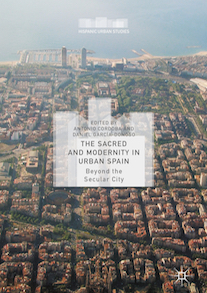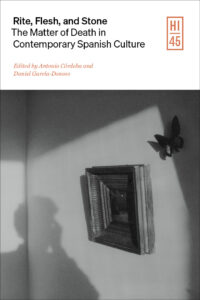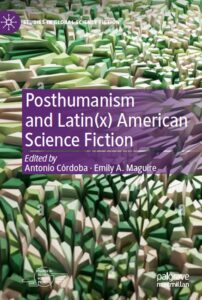 The Sacred and Modernity in Urban Spain: Beyond the Secular City. Edited by Antonio Cordoba and Daniel García-Donoso. New York: Palgrave Macmillan, 2016.
The Sacred and Modernity in Urban Spain: Beyond the Secular City. Edited by Antonio Cordoba and Daniel García-Donoso. New York: Palgrave Macmillan, 2016.
With an introduction by Antonio Cordoba and Daniel García-Donoso, essays by Samuel Llano, Wan Sonya Tang, Sara Muñoz-Muriana, Alberto Medina, Sarah Thomas, William Viestenz, Antonio Cordoba, Daniel García-Donoso, Nathan Richardson, Tatiana Alekseeva and Esteve Sanz, and an afterword by Joan Ramon Resina. Link. In Google Books. Front Matter.
This book explores how modernity, the urban, and the sacred overlap in fundamental ways in contemporary Spain. Urban spaces have traditionally been seen as the original sites of modernity, history, progress, and a Weberian systematic disenchantment of the world, while the sacred has been linked to the natural, the rural, mythical past origins, and exemption from historical change. This collection problematizes such clear-cut distinctions as overlaps between the modern urban and the sacred in Spanish culture are explored throughout the volume. Placed in the periphery of Europe, Spain has had a complex relationship with the concept of modernity and commonly understood processes of modernization and secularization, thus offering a unique case-study of the interaction between the modern and the sacred in the city.
“Religious studies are a critical but rarely explored area in Spanish cultural studies. At a time when secularity is in crisis, and religious ideas crop up in unexpected places, this volume is a timely, much-needed contribution that should pave the way for further explorations of the interplay between the secular and the religious in contemporary Spanish culture.” (Angel Loureiro, Professor of Spanish and Portuguese Languages and Cultures, Princeton University, USA)
“The Sacred and Modernity in Urban Spain offers, through innovative research and critical thinking, an in-depth analysis of the persistence of the sacred in a secular society. Engaging in excellent dialogue with some of the most important thinkers and cultural historians of religion, urban studies, political theory, and modernity, the essays in this collection open up new areas of cultural and theoretical inquiry about Spanish society and culture. This is a major contribution.” (Cristina Moreiras-Menor, Professor of Spanish and Women’s Studies, University of Michigan, USA)
“This collection on representations of cities in Spain is new and engaging. Each essay interrogates the conventional wisdom of ‘the sacred’ as exclusive to pre-modern urban space . . . these essays have encouraged me to re-think the very notion of modernity and pre-modernity.” (Michael Ugarte, Professor Emeritus, University of Missouri, USA).
***
 Rite, Flesh, and Stone: The Matter of Death in Contemporary Spanish Culture. Edited by Antonio Córdoba and Daniel García-Donoso. Nashville: Vanderbilt University Press, 2021.
Rite, Flesh, and Stone: The Matter of Death in Contemporary Spanish Culture. Edited by Antonio Córdoba and Daniel García-Donoso. Nashville: Vanderbilt University Press, 2021.
With an Introduction by Antonio Córdoba and Daniel García-Donoso, essays by Ana Fernández-Cebrián, Eugenia Afinoguénova, Ángel Loureiro, Elizabeth Scarlett, Annabel Martín, Patty Keller, Cristina Moreiras-Menor, Daniel García-Donoso, N. Michelle Murray, William Viestenz, Layla Renshaw, Jordi Moreras and Sol Tarrés, Pedro Aguilera-Mellado, and an afterword by Luis Martín-Estudillo and Nicholas Spadaccini. Link. Read the Introduction in Google Books.
Forensic science provides information and data behind the circumstances of a particular death, but it is culture that provides death with meaning. With this in mind, Rite, Flesh, and Stone proposes cultural matters of death as its structuring principle, operating as frames of the expression of mortality within a distinct set of coordinates. The chapters offer original approaches to how human remains are handled in the embodied rituals and social performances of contemporary funeral rites of all kinds; furthermore, they explore how dying flesh and corpses are processed by means of biopolitical technologies and the ethics of (self-)care, and how the vibrant and breathing materiality of the living is transformed into stone and analogous kinds of tangible, empirical presence that engender new cartographies of memory. Each coming from a specific disciplinary perspective, authors in this volume problematize conventional ideas about the place of death in contemporary Western societies and cultures using Spain as a case study.
Materials analyzed here—ranging from cinematic and literary fictions, to historical archives and anthropological and ethnographic sources—make explicit a dynamic scenario where actors embody a variety of positions towards death and dying, the political production of mortality, and the commemoration of the dead. Ultimately, the goal of this volume is to chart the complex network in which the disenchantment of death and its reenchantment coexist, and biopolitical control over secularized bodies overlaps with new avatars of the religious and non-theistic desires for memorialization and transcendence.
“The essays in this volume move swiftly and deftly across different aspects of culture—fiction and film, but also exhumations, funerals, processions, and inorganic objects. In ways that are at once surprising and innovative, this volume investigates some of the flash points of contemporary Spain.”
—Bécquer Seguín, Johns Hopkins University and writer for The Nation, Slate, Dissent, The Awl, and Public Books
“A solid and necessary volume that opens up new perspectives in the field of Iberian studies by focusing on a central issue for a society, such as death and its cultures, regarding contemporary Spain. The subject is presented in a complex, collective and panoramic way, focused on its political, social, philosophical and cultural dimensions.”
—Germán Labrador Méndez, author of Libidinal Economy in the Spanish Transition to Democracy
***
 Posthumanism and Latin(x) American Science Fiction. Edited by Antonio Córdoba and Emily A. Maguire. New York: Palgrave Macmillan, 2023. Link.
Posthumanism and Latin(x) American Science Fiction. Edited by Antonio Córdoba and Emily A. Maguire. New York: Palgrave Macmillan, 2023. Link.
With an introduction by Antonio Córdoba and Emily A. Maguire, essays by Ana Ugarte, Miguel García, Stephen C. Tobin, Maia Gil’Adi, Jonathan Risner, Samuel Ginsburg, Liliana Colanzi, M. Elizabeth Ginway, William Orchard, and Antonio Córdoba, and an afteword by Silvia Kurlat Ares.
This volume explores how Latin American and Latinx creators have engaged science fiction to explore posthumanist thought. Contributors reflect on how Latin American and Latinx speculative art conceptualizes the operations of other, non-human forms of agency, and engages in environmentalist theory in ways that are estranging and open to new forms of species companionship. Essays cover literature, film, TV shows, and music, grouped in three sections: “Posthumanist Subjects” examines Latin(x) American iterations of some of the most common figurations of the posthuman, such as the cyborg and virtual environments and selves; “Slow Violence and Environmental Threats” understands that posthumanist meditations in the hemisphere take place in a material and cultural context shaped by the catastrophic destruction of the environment; the chapters in “Posthumanist Others” shows how the reimagination of the self and the world that posthumanism offers may be an opportunity to break the hold that oppressive systems have over the ways in which societies are constructed and governed.
“This is a timely intervention into a growing debate in Latin American cultural studies. It is particularly valuable due to the geographical breadth of its scope and its attention to aesthetic strategies across a wide range of different media. Essential reading for students and scholars interested in Latin American science fiction and speculative aesthetics, posthumanism and the environmental humanities.”
—Edward King, Associate Professor, University of Bristol, UK
“This book explores for the first time Latin American posthumanism from the Global South. It is a proposal that appeals to us from the point of view of (techno)(cyber) corporealities that form the normative world-systems of globalization and offer dissident alternatives. A collection of brilliant essays that offer a melting pot of categories and typologies of science fiction, from neoliberal posthumanism to feminist critical posthumanism. A lucid reflection on inequalities based on ethnicity, class, gender, sex and sexuality. A publication of reference that shows that the heartbeat of the twenty-first century is posthuman, and that everything posthuman is political.”
Teresa López-Pellisa, Universidad de Alcalá, Spain
